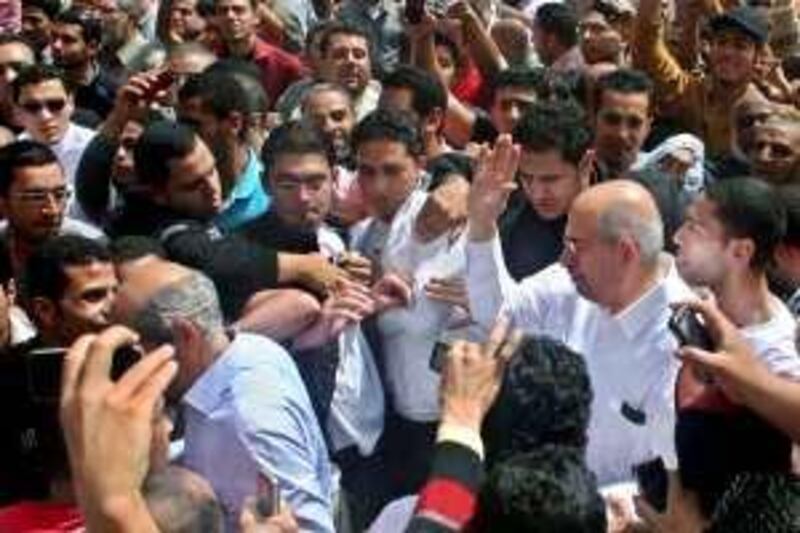MENIYAT SAMANOUD // In his first public appearance outside the Egyptian capital, Mohammed ElBaradei said he saw "an overwhelming and burning desire for change" among the more than 1,000 supporters who came to see and hear the former head of the UN nuclear watchdog.
Mr ElBaradei spoke to his supporters under the watchful eye of state security in Meniyat Samanoud, a town in Mansoura province in the Nile delta. As he emerged from Al Nour Mosque on Friday, he was greeted by people chanting his name and calling him a "hero". "What I saw today doesn't need words and it reveals an overwhelming and burning desire for change among the Egyptian people," he said to huge applause. "We are all partners in change, which won't take place until each one of you feels that he is responsible for change."
Mr ElBaradei, 67, served as a director for the Vienna-based International Atomic Energy Agency for 12 years, and has spent more than 25 years living outside of his native Egypt before returning in February and injecting excitement into a stagnant political landscape. "We thought we were finished as Egyptians, but this man returned our spirit to us," said Hamdi Zaki, 58, a lawyer at the mosque rally. "He is our saviour, may God bless him."
Mr ElBaradei, a Nobel laureate, is considered a potential candidate for president in the 2011 elections, although he is currently not allowed to run under the constitution because he is not a member of an established political party. Shortly after his return to Egypt in February, Mr ElBaradei formed the National Front for Change, calling for a constitutional amendment that would allow independents, such as himself, to run in the 2011 presidential race. The measure also would restore judicial supervision over elections. He and others are also calling for international monitors
"We are 80 million Egyptians who have survived 7,000 years," said Mr ElBaradei. "We have to move Egypt from pharaonic regime to a democratic rule." Hosni Mubarak, 81, the Egyptian president, has been in power since 1981. He is recovering in the Red Sea resort of Sharm el Sheikh from gallbladder surgery in Germany a month ago. Mr Mubarak has not said whether he will run in 2011 and there is speculation he will be succeeded by his youngest son Gamal, 46, a former investment banker who has risen swiftly up the ranks of his father's ruling National Democratic Party since 2002.
"I'm very happy of course," Mr ElBaradei told The National before addressing scores that gathered to greet him in Meniyat Samanoud. "It's very clear people are hungry for change." Mr ElBaradei urged all the opposition to transcend their differences and to unite. He again emphasised the right of the Muslim Brotherhood, Egypt's oldest and largest Islamic group, to have its own political party. The group has been banned since 1954, but its members have been able to run as independents in legislative elections.
The group - which has almost 400 of its members, including senior leaders, in prison - said on Friday that it did not ask its supporters to meet Mr ElBaradei in Mansoura. The Brotherhood and other established political groups have seemed unsure of how to react to Mr ElBaradei's growing popularity, although there appears to be a shift of how he is portrayed in the media. Al Fagr, an independent weekly, warned Mr ElBaradei on its front page yesterday that "taking to the street leads to either death, prison or expulsion".
However, the editor of the oldest and largest state-owned daily took a new tone. "Dr Mohammed ElBaradei is a respectable personality and a source of pride for every Egyptian," said Abdel Moneim Saeed, the editor of Al Ahram daily at a cultural salon in Alexandria last week. "It's about time we deal with ElBaradei seriously," he added, representing a sharp change in how Mr ElBaradei was portrayed in state media since February.
However the majority of the state-owned media are still waging a bitter campaign against him. Mr ElBaradei announced his plan to visit the Coptic Cathedral in Cairo yesterday, to congratulate the Christian Copts of Easter. "We are a civil state in which all citizens are equal," said Mr ElBaradei. "I believe that religion is for God, and the country is for all." So far, security has not prevented him or his supporters from gathering. However, about three weeks ago, Mr ElBaradei had condemned the alleged beating by Egyptian security of one of his supporters, Taha Abdel, 36, a physiotherapist, as he reportedly attempted to organise a rally in support of Mr ElBaradei in Fayoum. Two of Mr ElBaradei's supporters were detained for a day on the eve of his arrival in February.
But his appearance on Friday went on without any problems. As Mr ElBaradei, without bodyguards, walked to a street near the mosque, he was surrounded by his supporters. Many people were eager to shake his hand, kiss him and take photos of him with their mobiles. "I will make a voting card for the first time in my life for his sake," said Om Ahmed, 62. As more people joined the crowd after he left the mosque, balconies above the street became full with onlookers. "This is awesome, I didn't expect people to greet him like this," said Mohammed el Askari, a dentist in his late twenties.
Amal Nasr, 20, a housewife, said: "People are so poor, they are selling their children. I hope he can change this." nmagd@thenational.ae





